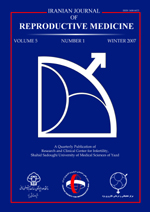
|
International Journal of Reproductive BioMedicine
Research and Clinical Center for Infertility, Shahid Sadoughi University of Medical Sciences of Yazd
ISSN: 1680-6433
EISSN: 1680-6433
Vol. 14, No. 5, 2016, pp. 309-316
|
 Bioline Code: rm16040
Bioline Code: rm16040
Full paper language: English
Document type: Research Article
Document available free of charge
|
|
|
International Journal of Reproductive BioMedicine, Vol. 14, No. 5, 2016, pp. 309-316
| en |
Vaginal progesterone on the prevention of preterm birth and neonatal complications in high risk women: A randomized placebo-controlled double-blind study
Azargoon, Azam; Ghorbani, Raheb & Aslebahar, Fereshteh
Abstract
Background: Preterm birth is the major cause of neonatal mortality and morbidity.
Objective: The aim of this study was to evaluate the effect of prophylactic vaginal progesterone on decreasing preterm birth rate and neonatal complications in a high-risk population.
Materials and Methods: A randomized, double-blind, placebo-controlled study was performed on 100 high-risk singleton pregnancies. Vaginal suppository progesterone (400 mg) or placebo was administered daily between 16-22 wks to 36 wks of gestation. Progesterone (n=50) and placebo (n=50) groups were compared for incidence of preterm delivery and neonatal complications.
Results: The preterm birth rate was 52%. Preterm birth rate before the 37 wks of gestation (68% vs. 36%: RR=1.89, 95% CI: 1.25-2.86) and also before the 34 wks of gestation (42% vs. 18%: RR=2.33, 95% CI: 1.19-4.58) in placebo group was significantly higher than progesterone group. Our study also showed that the administration of vaginal progesterone was associated with a significant reduction in the risk of birth weight ≤2500 gr, the rates of respiratory distress syndrome (RDS) and admission to the Neonatal Intensive Care Unit (NICU) in the progesterone group when compared with the placebo group. However, there was no significant difference between the two groups in terms of neonatal death, days of admission in NICU, intraventricular hemorrhage and necrotizing enterocolitis.
Conclusion: Prophylactic vaginal progesterone reduced the rate of preterm delivery, the risk of a birth weight ≤2500 gr, the rates of RDS and admission to NICU in women who were at risk of preterm delivery.
Keywords
Premature birth; Prevention; Progesterone; Randomized controlled trial
|
| |
© Copyright 2016 - Iranian Journal of Reproductive Medicine
Alternative site location: http://www.ijrm.ir
|
|
